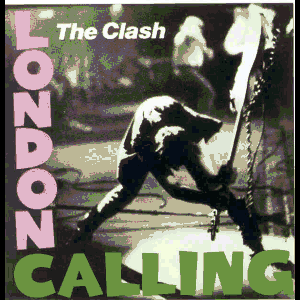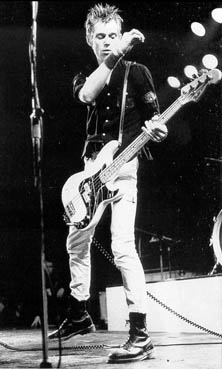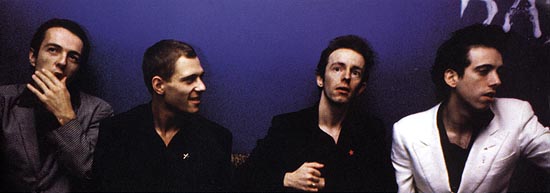

 The Clash is known for taking the raw anger of British punk and working
it into a political aesthetic agenda. They outlived and outdid all of their
fellow bands in terms of depth and length of career. They were seen
as rebels with many causes, from anti-Thatcherism, to racial unity, to
the Sardinistas. Their experiments with funk, reggae, and rap never
took them far from a three-minute pop song. Sometimes referred to as, "
the only band that matters," the Clash fell apart just as they broke through
to a wide American audience. By then they had shown that punk was
there to stay and had delivered an arsenal of unforgettable rock songs.
The Clash is known for taking the raw anger of British punk and working
it into a political aesthetic agenda. They outlived and outdid all of their
fellow bands in terms of depth and length of career. They were seen
as rebels with many causes, from anti-Thatcherism, to racial unity, to
the Sardinistas. Their experiments with funk, reggae, and rap never
took them far from a three-minute pop song. Sometimes referred to as, "
the only band that matters," the Clash fell apart just as they broke through
to a wide American audience. By then they had shown that punk was
there to stay and had delivered an arsenal of unforgettable rock songs.
The Clash were very much dependant on the chemistry of its four longtime
and original band members, Strummer, Jones, Simonon, and Headon.
Strummer, the primary songwriter, was the son of a British diplomat, and
grew up in a boarding school. He quit school while still in his teens,
to form his first band, 101ers.
Jones and Simonon are both from working class families. Simonon was
attending art school when he met Jones. Simonon had never played an instrument
until he had heard the Sex Pistols.  Inspired by Sid Vicious, the bassist in the Sex Pistols, he began to play
the bass guitar, and joined Jones in his band, the London SS. Seeing the
Sex Pistols also inspired Strummer to leave the 101ers and along with Levene
to join Jones, Simonon, and Chimes in their new group. Jones named
it the Clash.
Inspired by Sid Vicious, the bassist in the Sex Pistols, he began to play
the bass guitar, and joined Jones in his band, the London SS. Seeing the
Sex Pistols also inspired Strummer to leave the 101ers and along with Levene
to join Jones, Simonon, and Chimes in their new group. Jones named
it the Clash.
The Clash played their first gig in summer of 1976 opening up for the Sex
Pistols. They opened for the Sex Pistols on their Anarchy in the
U.K. tour after Leven quit (he later joined Public Image Ltd. with Johnny
Rotten). The Clash were managed by Malcolm McLaren's (who managed
the Sex Pistols) associate, Bernard Rhodes. Bernie helped the band articulate
its political mission. The Sex Pistols were nihilists, while the
Clash were protesters, with songs about racism, police brutality, and disenfranchisement.
Over the years, the Clash has been in several political causes and has
performed benefit concerts for Rock Against Racism.
Chimes quit the band in late 1976. Headon, who had been drumming with Pat
Travers in Europe since his career in London SS, accompanied the group
on their first national headlining tour. The White Riot Tour, named
after a current Clash single, ended at a London concert where the audience
ripped the seats out of the floor. It was a first of a series of
police confrontations, especially in Britain.
 In December of 1981 the band was beginning to record their next album,
when Headon was arrested for heroin possession. In April 1982, just
as Combat Rock was about to be released, Strummer disappeared to be found
a month later in Paris. Upon Strummer return, Headon left the group
claiming "political differences", although Strummer later reviewed that
it was because the drummer had a drug problem. Chimes signed back up for
the following U.K. tour.
In December of 1981 the band was beginning to record their next album,
when Headon was arrested for heroin possession. In April 1982, just
as Combat Rock was about to be released, Strummer disappeared to be found
a month later in Paris. Upon Strummer return, Headon left the group
claiming "political differences", although Strummer later reviewed that
it was because the drummer had a drug problem. Chimes signed back up for
the following U.K. tour.
In the fall of 1983 Simonon and Strummer kicked out Jones and replaced
him with two guitarists, Vince White and Nick Sheppard. Cut the Crap
(1983 release) was poorly received by fans and critics, and soon after
the band called it quits realizing they were a feeble imitation of their
old selves.